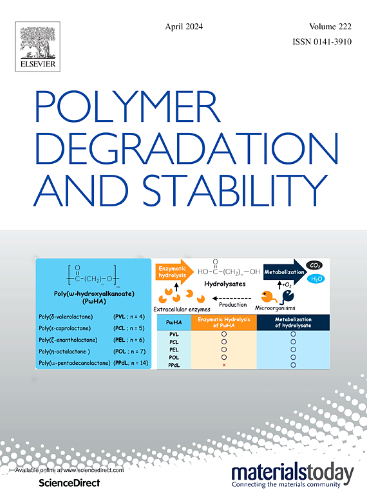Flame-retardant and solvent-free polyurethane adhesive via synergistic phosphorus-containing polyol and ammonium dihydrogen phosphate
IF 6.3
2区 化学
Q1 POLYMER SCIENCE
引用次数: 0
Abstract
To meet the demands for fire safety and environmental sustainability, developing solvent-free, flame-retardant polyurethane adhesives with high bonding strength is crucial. In this work, a novel intrinsically flame-retardant phosphorus-containing polyester polyol (ADHE) is synthesized and combined with the flame retardant aluminum diethylphosphinate (ADP) to enhance the flame-retardant properties of the bio-based polyurethane adhesive APUx (where x denotes the mass fraction of ADP). The results show excellent synergistic flame-retardant effects. When the mass fraction of ADP is 10 %, APU10 exhibits good anti-dripping and self-extinguishing performance. It achieves a vertical combustion test (UL-94) V-0 rating, with a limiting oxygen index (LOI) increasing from 20 % for the pure sample to 29 %, and a 50.4 % reduction in total heat release (THR). Hydrogen bonding in the matrix improves the interface bond to the substrate, resulting in a shear strength of 21.7 MPa on the aluminum substrate. This study proposes an integrated strategy for developing flame-retardant polyurethane adhesives with high adhesion performance.

求助全文
约1分钟内获得全文
求助全文
来源期刊

Polymer Degradation and Stability
化学-高分子科学
CiteScore
10.10
自引率
10.20%
发文量
325
审稿时长
23 days
期刊介绍:
Polymer Degradation and Stability deals with the degradation reactions and their control which are a major preoccupation of practitioners of the many and diverse aspects of modern polymer technology.
Deteriorative reactions occur during processing, when polymers are subjected to heat, oxygen and mechanical stress, and during the useful life of the materials when oxygen and sunlight are the most important degradative agencies. In more specialised applications, degradation may be induced by high energy radiation, ozone, atmospheric pollutants, mechanical stress, biological action, hydrolysis and many other influences. The mechanisms of these reactions and stabilisation processes must be understood if the technology and application of polymers are to continue to advance. The reporting of investigations of this kind is therefore a major function of this journal.
However there are also new developments in polymer technology in which degradation processes find positive applications. For example, photodegradable plastics are now available, the recycling of polymeric products will become increasingly important, degradation and combustion studies are involved in the definition of the fire hazards which are associated with polymeric materials and the microelectronics industry is vitally dependent upon polymer degradation in the manufacture of its circuitry. Polymer properties may also be improved by processes like curing and grafting, the chemistry of which can be closely related to that which causes physical deterioration in other circumstances.
文献相关原料
公司名称
产品信息
阿拉丁
1,6-hexanediol (HDO)
阿拉丁
castor oil (CA)
阿拉丁
Polytetramethylene ether glycol (PTMG)
阿拉丁
aluminum diethylphosphite (ADP)
阿拉丁
1,4-butanediol (BDO)
阿拉丁
1,6-hexanedioic acid (AC)
 求助内容:
求助内容: 应助结果提醒方式:
应助结果提醒方式:


